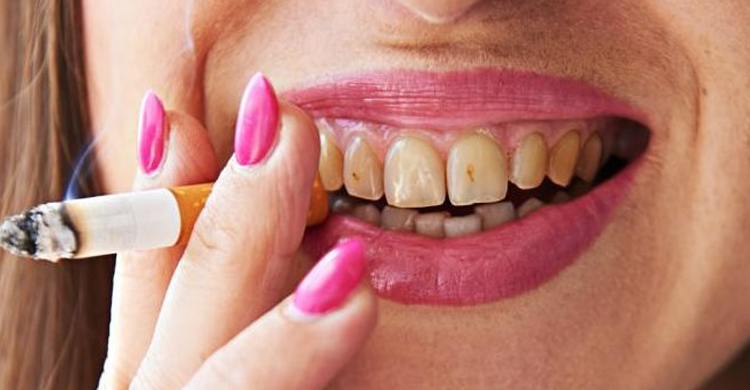
Blog Posts
RECENT BLOG POST


04 Aug 2021


10 Aug 2021


10 Aug 2021


By Dr. Aastha Chandra

29 Jun 2022
SMOKING AND ORAL HEALTH
Most people are now aware that smoking is bad for their health. It can cause many different medical problems and, in some cases, fatal diseases. However, many people don’t realise the damage that smoking does to their mouth, gums and teeth.
Smoking can lead to the following dental problems:
- Cigarette tar can stain your teeth, discolour your tongue and lead to bad breath.
- Increased build-up of plaque and tartar on the teeth. You are also twice as likely to experience gum diseases, which is one of the main reasons for tooth loss.
- Increased loss of bone within the jaw which causes gum recession.
- Inflammation of the salivary gland openings on the roof of the mouth.
- Increased risk of leucoplakias, which are white patches inside the mouth. Exposure to harmful chemicals found in cigarettes, cigars and smokeless tobacco, can also cause oral cancer.
- Smokers’ immune system becomes compromised which leads to weakened defences against oral diseases and delayed healing process following tooth extraction, periodontal treatment, or oral surgery.
- Lower success rate of dental implant procedures.
- Mouth sores and ulcers – these are very commonly present in the soft tissues of smokers.
Do Pipe and Cigar Smoking Cause Dental Problems?
Yes, like cigarettes, pipes and cigars do lead to oral health problems. Cigar smokers and pipe smokers also experience tooth loss and bone loss at rates equivalent to that of cigarette smokers. Beyond these risks, pipe and cigar smokers are still at risk for oral and pharyngeal (throat) cancers, bad breath, stained teeth, and increased risk of periodontal (gum) disease.
Are There Special Dental Products For Smokers?
There are special toothpastes for people who smoke. They are sometimes a little more abrasive than ordinary toothpastes and you should use them with care. There are several ‘whitening’ toothpastes in the market. Although they do not affect the natural colour of your teeth, they may be effective at removing staining, and therefore may improve the overall appearance of your teeth.
Dental Hygiene Tips To Improve Oral Health:
While quitting smoking is the most effective way to ensure better oral health, there are some tips that those who choose to smoke should follow:
1) Do not skip regular check-ups with your dentist. During these visits, your dentist can watch for signs of developing gum disease and oral cancers. Normally, people should visit their dentist twice a year, but those who smoke should consider more frequent visits.
2) Have regular cleans ups done.
3) Have a proper oral hygiene plan, including:
a) Smokers should be brushing, flossing, and using a tongue cleaner and mouthwash on a regular basis, at least twice daily.
b) Having the right toothbrush can be something that is often overlooked, but it is something that should not be neglected. Toothbrush bristles should be stiff and strong enough to be able to tackle the hard stains left by tar in the tobacco. The toothbrush should also be able to reach the difficult areas in the back of the gums.
c) Smokers should also buy toothpaste that is made specifically for smokers, as they are chemically stronger and better able to tackle harder to clean bacteria.
d) Mouthwash helps combat the bad breath many smokers experience. There are also mouthwashes that are targeted just for smokers.
4) Smoking isn’t the only thing that is harmful to teeth. Some foods can also cause staining and erosion. Smokers should try to avoid foods that can cause further staining, compounding on the damages already done by the use of tobacco. Coffee and soda are common drinks that can stain the teeth. Smokers should also avoid eating foods that are highly acidic in composition as they can cause enamel breakdown and cavities.
5) Smokers should also perform oral health self-check-ups on a regular basis, including:
a) Smokers should check for long lasting sores around the face, mouth, and neck. If the sores persist after two weeks, it is a sign of a more serious problem.
b) People who smoke should also check for recurrent bleeding in the mouth, lesions, swelling, and lumps.
c) White, red, or dark patches on the inside of the mouth, under the tongue, and on the cheeks that last more than two weeks should be brought to the attention of a dentist.
d) Lumps on the lips and gums can also indicate a more serious problem, as should numbness or pain in any part of the mouth.

